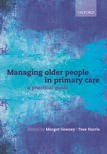 Managing older people in primary care: A practical guide
Managing older people in primary care: A practical guide
Published online:
01 May 2013
Published in print:
01 July 2009
Online ISBN:
9780191768705
Print ISBN:
9780199546589
Contents
-
-
-
-
-
-
-
-
-
-
-
-
-
-
-
-
Introduction Introduction
-
Impact of falls and fractures on individuals and services Impact of falls and fractures on individuals and services
-
Assessing and managing falls risk in the community Assessing and managing falls risk in the community
-
Assessing and managing fracture risk in older people in the community Assessing and managing fracture risk in older people in the community
-
Managing falls and fracture risk in care homes Managing falls and fracture risk in care homes
-
Auditing assessment and management of falls and fracture risk Auditing assessment and management of falls and fracture risk
-
Conclusion Conclusion
-
References References
-
-
-
-
-
-
-
-
-
-
-
-
-
-
-
-
-
-
-
Cite
Martin, Finbarr C, and Denise Kendrick, 'Falls and osteoporosis', in Margot Gosney, and Tess Harris (eds), Managing older people in primary care: A practical guide (Oxford , 2009; online edn, Oxford Academic, 1 May 2013), https://doi.org/10.1093/med/9780199546589.003.0013, accessed 16 May 2025.
Abstract
Chapter 13 discusses falls and osteoporosis, where a fall is ‘an event whereby an individual comes to rest on the ground or another lower level with or without a loss of consciousness’. There are other definitions but this simple one adopted by the National Institute of Health and Clinical Excellence (NICE) makes sense in clinical practice. It includes a spectrum of events with syncope at one end and loss of balance due to postural instability at the other. A fall is a symptom, not a diagnosis, and although assessment can be a clinical challenge, it is worthwhile as the frequency of falls can be reduced and the devastating consequences can be minimized.
Subject
Primary Care
Collection:
Oxford Medicine Online
Disclaimer
Oxford University Press makes no representation, express or implied, that the drug dosages in this book are correct.
Readers must therefore always …
More
Oxford University Press makes no representation, express or implied, that the drug dosages in this book are correct.
Readers must therefore always check the product information and clinical procedures with the most up to date published product information and data sheets
provided by the manufacturers and the most recent codes of conduct and safety regulations. The authors and the publishers do not accept responsibility or
legal liability for any errors in the text or for the misuse or misapplication of material in this work. Except where otherwise stated, drug dosages
and recommendations are for the non-pregnant adult who is not breastfeeding.
© Oxford University Press
You do not currently have access to this chapter.
Sign in
Personal account
- Sign in with email/username & password
- Get email alerts
- Save searches
- Purchase content
- Activate your purchase/trial code
- Add your ORCID iD
Purchase
Our books are available by subscription or purchase to libraries and institutions.
Purchasing informationMetrics
View Metrics
Metrics
Total Views
2
2
Pageviews
0
PDF Downloads
Since 10/1/2022
| Month: | Total Views: |
|---|---|
| October 2022 | 1 |
| July 2024 | 1 |
Citations
Get help with access
Institutional access
Access to content on Oxford Academic is often provided through institutional subscriptions and purchases. If you are a member of an institution with an active account, you may be able to access content in one of the following ways:
IP based access
Typically, access is provided across an institutional network to a range of IP addresses. This authentication occurs automatically, and it is not possible to sign out of an IP authenticated account.
Sign in through your institution
Choose this option to get remote access when outside your institution. Shibboleth/Open Athens technology is used to provide single sign-on between your institution’s website and Oxford Academic.
If your institution is not listed or you cannot sign in to your institution’s website, please contact your librarian or administrator.
Sign in with a library card
Enter your library card number to sign in. If you cannot sign in, please contact your librarian.
Society Members
Society member access to a journal is achieved in one of the following ways:
Sign in through society site
Many societies offer single sign-on between the society website and Oxford Academic. If you see ‘Sign in through society site’ in the sign in pane within a journal:
If you do not have a society account or have forgotten your username or password, please contact your society.
Sign in using a personal account
Some societies use Oxford Academic personal accounts to provide access to their members. See below.
Personal account
A personal account can be used to get email alerts, save searches, purchase content, and activate subscriptions.
Some societies use Oxford Academic personal accounts to provide access to their members.
Viewing your signed in accounts
Click the account icon in the top right to:
Signed in but can't access content
Oxford Academic is home to a wide variety of products. The institutional subscription may not cover the content that you are trying to access. If you believe you should have access to that content, please contact your librarian.
Institutional account management
For librarians and administrators, your personal account also provides access to institutional account management. Here you will find options to view and activate subscriptions, manage institutional settings and access options, access usage statistics, and more.